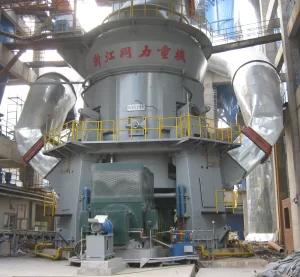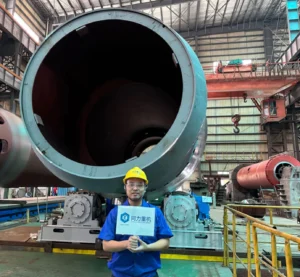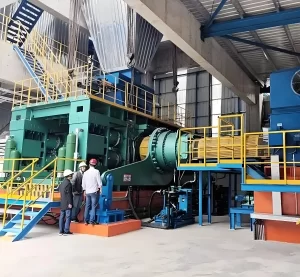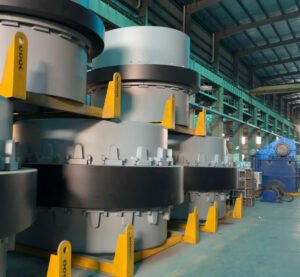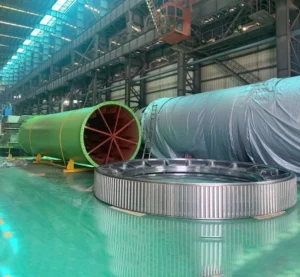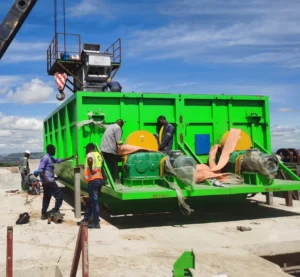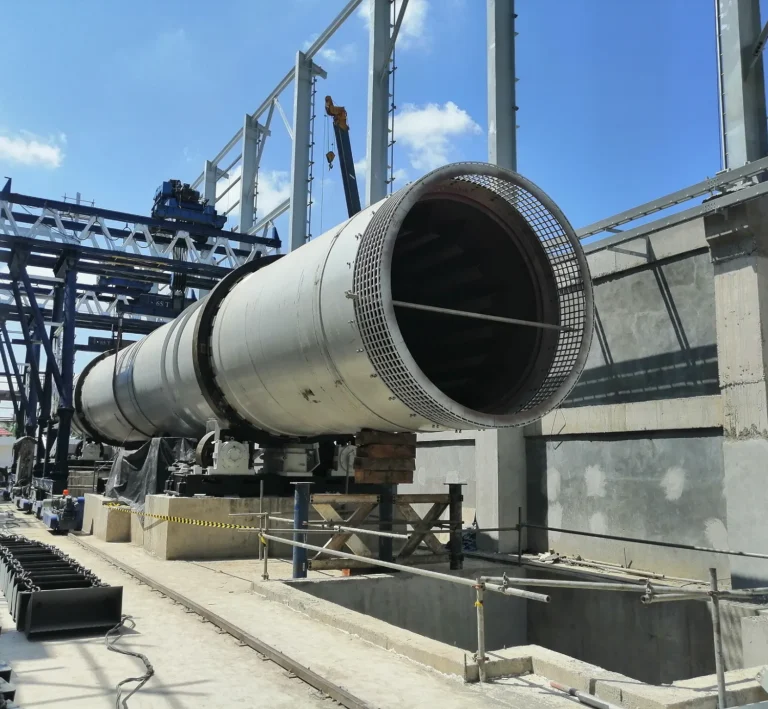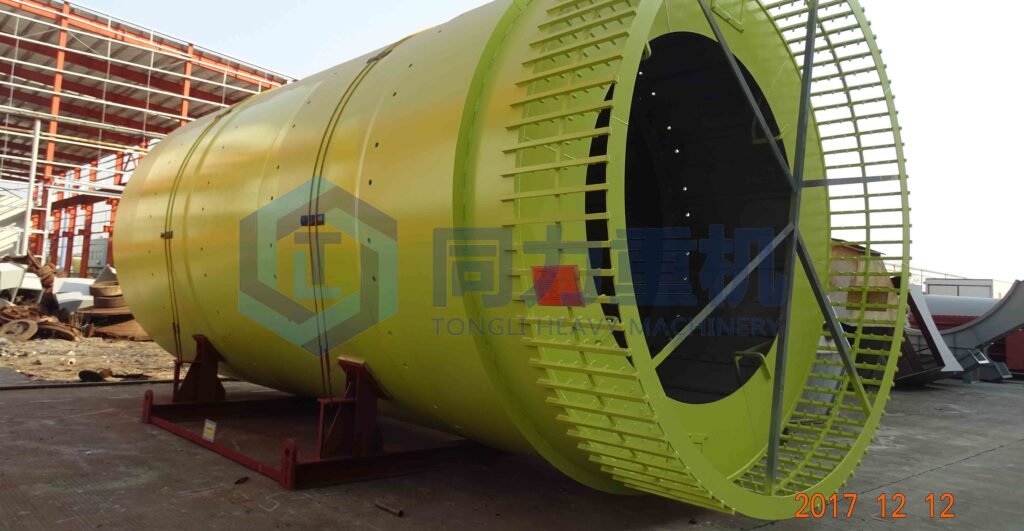
Introduction:
On December 26, 2019, the 600,000 t/year Sulfuric Acid Project and 400,000 t/year Triple Superphosphate (TSP) Project in Tunisia—both general contracted by East China Engineering Science and Technology Co., Ltd. (ECEC)—held their mechanical completion signing ceremony at the construction site in Gafsa, Tunisia. Attending the event were Wang Wenbin, Chinese Ambassador to Tunisia; Zhang Fengling, Commercial Counselor; Mr. Abderrazak Ouanassi, President of Groupe Chimique Tunisien (GCT); and Cui Congquan, General Manager of ECEC. The successful mechanical completion of the GCT Sulfuric Acid and TSP projects represented a significant milestone in ECEC’s capability to deliver overseas projects, establishing a strong foundation for expanding its presence in the Tunisian and North African markets. It is noteworthy that the project’s main equipment—the Φ4.0 × 30 m rotary drum granulation dryer and Φ3.0x12m Graulator —was supplied by Zhejiang Tongli Heavy Machinery Manufacturing Co., Ltd. Below is a on-site installation commissioning video our engineer took.
Who is the owner of the GCT M'dhilla TSP DAP Plant?
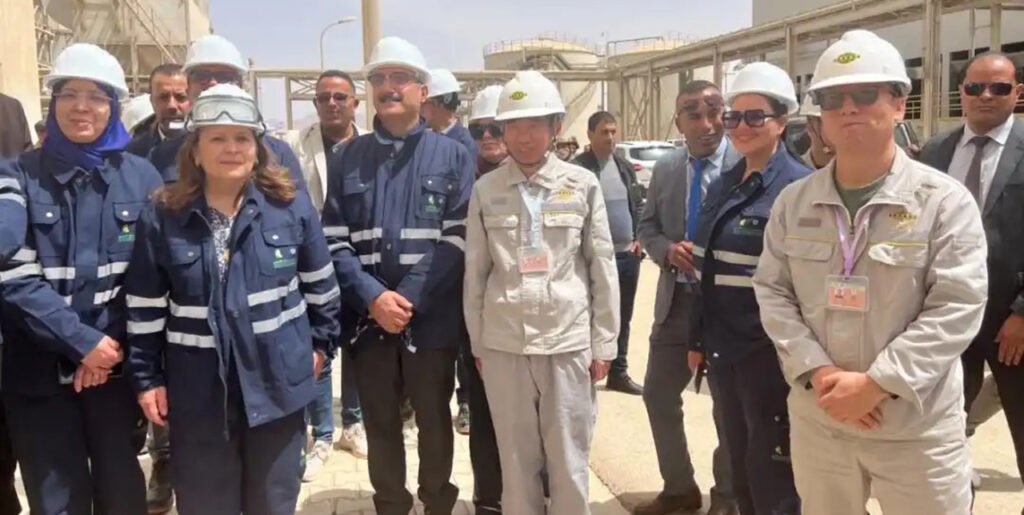
Groupe Chimique Tunisien (GCT) is a major Tunisian state-owned chemical company, established in 1972 and headquartered in Gabès. The group primarily develops, processes, and exports Tunisia's abundant phosphate resources, producing a wide range of fertilizers and chemical products, including phosphoric acid, triple super phosphoric acid (TSP), diammonium phosphate (DAP), and fluorides. Tunisia is a major global exporter of phosphate rock, and GCT plays a vital role in the national economy, with its fertilizer products primarily sold to European, Asian, and African markets. The group's production facilities are located in Gabès, Sfax, and M'dhilla, with the M'dhilla plant primarily producing TSP (concentrated monoammonium phosphate) and related phosphate fertilizer products. GCT not only possesses core technologies for phosphate rock processing and fertilizer production, but also continuously invests in environmental protection, energy conservation, and by-product recycling to meet the demands of international markets and environmental regulations.
Basic information/data about the M'dhilla TSP DAP Plant
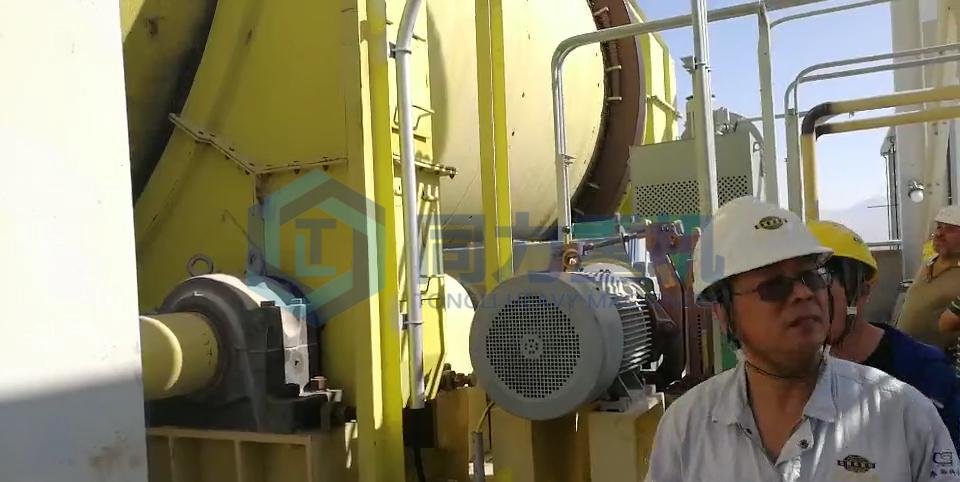
This project is the fourth fertilizer project in Tunisia's Gafsa Governorate. The first three, all launched in 2010, were contracted by Donghua Technology(CNCEC) and Hyundai of South Korea. The project has an investment of approximately TWD 632 million, funded by the Arab Fund for Economic and Social Development and the European Investment Bank.
Project Background:
- Located in M’dhilla, Gafsa, a major phosphate mining region in Tunisia.
- Part of Tunisia’s efforts to expand phosphate processing and reduce reliance on raw phosphate exports.
- Triple Superphosphate (TSP) is a high-grade fertilizer produced from phosphate rock.
Technology and process:
The project uses process technology provided by the Tunisian Chemical Group, and the performance assessment indicators are guaranteed by the owner. Donghua Technology completes the engineering general contracting work in accordance with the contract, local project and industry technical specifications, and ensures that the supplied and installed equipment passes the mechanical performance assessment.
Construction Process:
The project encountered numerous challenges. For example, the shipment of the core equipment made by Zhejiang Tongli Heavy Machinery Co., Ltd, the dryer, coincided with the Chinese New Year holiday, resulting in a cargo ship's ocean voyage, which should have taken two months, taking six months. Donghua Technology collaborated with the government, the client, the freight forwarder, and other stakeholders to safely deliver the goods to the construction site. To ensure professional installation and maintenance of the multi-split air conditioning system, TONGLI Installation staff visited the site 11 times, overcoming cultural differences and varying work paces to ultimately achieve a successful partnership. As of 2019, the sulfuric acid project had shipped 69 shipments, including 20 by sea, 29 by air, and 20 by other means. The TSP project had shipped 28 shipments, including 26 by sea and 2 by air.
Project Completion:
On October 13, 2019, Tunis time, the project's granulation dryer made by TONGLI Heavy Machinery operated continuously for four hours, meeting all performance requirements and successfully completing a single-vehicle test run. On December 26, 2019, the project held a mechanical completion ceremony in Medila, Gafsa Governorate, Tunisia. The president of the Tunisian Chemical Group highly praised the excellent project completed by China, believing it to be a continuation of decades of cooperation between Arab countries and China in the chemical industry.
Current status:
According to the latest information, the M'dhilla II plant, part of the Tunisian Chemical Group (GCT), will was operational during the second quarter of 2019. The construction progress rate of the first two phases of the plant currently reaches 98%, according to Abdessalem Chouaia, director of the plant. The latter also stated that environmental and international standards were respected in all stages of the project. This plant will also create 739 jobs; 150 employees were already hired in 2013, and the remaining recruitment will take place over several phases.
Who is the General contractor for GCT M'dhilla 400,000 tons per year Sulfuric Acid and TSP DAP Plant?
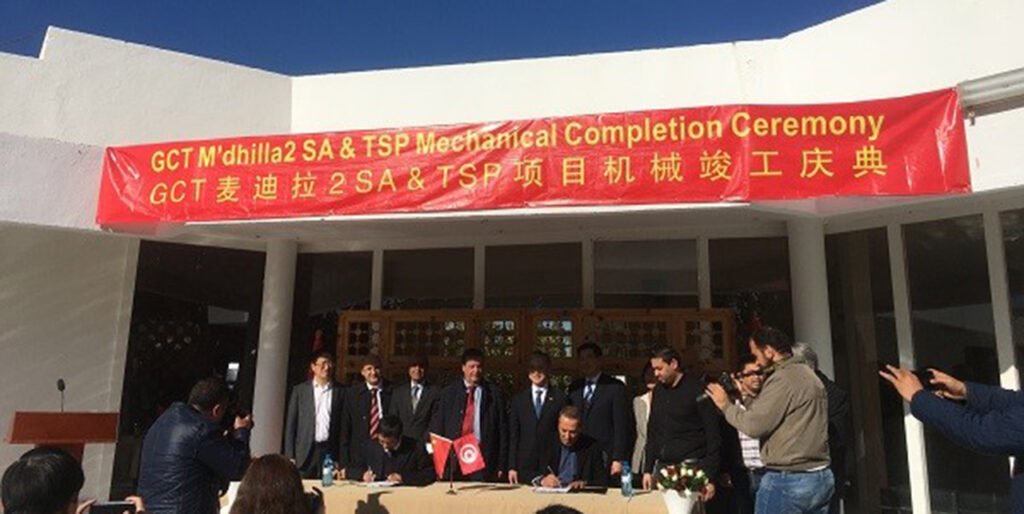
China National Chemical Engineering Co., Ltd. (CNCEC), also known as China Chemical Engineering Group Corporation, is a large state-owned engineering and construction company in China. It is involved in various sectors, including petrochemicals, power, infrastructure, and industrial projects worldwide. CNCEC was awarded a contract for M’dhilla Triple Superphosphate (TSP) Plant and the Gabès Chemical Terminal (GCT) project in Tunisia. The GCT is a major industrial project aimed at expanding Tunisia's phosphate processing and fertilizer production capacity.
Contract Signing Overview
On December 27, 2015, witnessed by the Tunisian Minister of Industry and the Governor of Gafsa Governorate, CNCEC and the Tunisian Chemical Group (GCT) (hereinafter referred to as "GCT" or the "Owner") signed the "General Contract for the 400,000 Tons/Year TSP (Heavy Calcium Carbonate) Project" (hereinafter referred to as the "Contract") in Gafsa, Tunisia. In accordance with local laws, this Contract shall become effective only after the Project Owner completes registration procedures. On January 5, 2016, CNCEC received written notification from GCT that, upon registration, this Contract officially took effect on January 6, 2016. The Contract stipulates that CNCEC will undertake the design, construction, installation, and service of the Project. The contract price is USD 45,081,467.00 + Tunisian dinar 37,028,604.00, equivalent to approximately RMB 412 million (calculated at the rate of USD 1.0 = RMB 6.5 and Tunisian dinar 1.0 = RMB 3.2). The contract period is 24 months (i.e., from the effective date of the contract to the start-up and commissioning of the plant).
Introduction to the Contracting Party
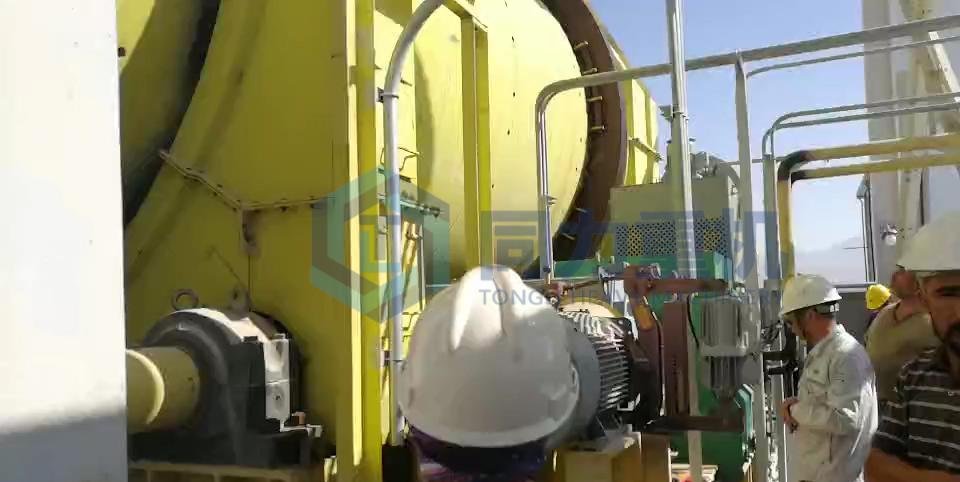
Founded in 1947, the Tunisian Chemical Group is the largest state-owned company in Tunisia. It is the largest processor and exporter of phosphate rock in Tunisia and has traditionally been Tunisia's largest export earner. It holds a pivotal position in the Tunisian economy and possesses the capacity to perform this contract. On October 21, 2010, CNCEC and the Tunisian Chemical Group signed a general contracting agreement for a 1,800-ton-per-day sulfuric acid and low-level heat recovery project (see Donghua Technology Announcement No. 2010-027 for details). Currently, construction of the facility is nearing mechanical completion.
Key Terms of the Contract
1. Effective Date:
This contract shall become effective upon the signatures and seals of both parties, completion of contract registration procedures by Tunisia Chemical Group, and written notification to CNCEC.
2. Project Scale and Location:
400,000 tons of TSP (heavy calcium carbonate) per year project; construction site in Gafsa, Tunisia.
3. Scope of Work:
CNCEC will undertake the design, construction, installation, and service of the project.
4. Contract Price and Payment:
The advance payment will be made upon CNCEC's submission of a letter of guarantee for an equivalent value; progress payments will be made according to the progress of design, delivery, and construction. The retention fee is 10% of the contract amount, which may be replaced by a 10% letter of guarantee upon preliminary acceptance.
5. Contract Term:
The total project duration is 24 months (i.e., from the effective date of this contract until the plant is commissioned and put into operation).
6. Responsibilities of Both Parties:
This contract will be funded by FADES (Arab Fund for Economic and Social Development). Tunis Chemical Group will pay the project fee in accordance with the terms of this contract. CNCEC will complete the general contracting work in accordance with the requirements of this contract, local project, and industry technical specifications, standards, procedures, and regulations, and ensure that the supplied and installed equipment passes mechanical performance tests. This contract stipulates that the TSP project will utilize the process technology provided by the owner, and the performance test indicators will be guaranteed by the owner.
Impact of Contract Performance on the Company
Impact of This Contract on the CNCEC's Financial Condition and Operating Results
The contract price is US$45,081,467.00 + Tunisian Dinar 37,028,604.00, equivalent to approximately RMB 412 million. The contract term is 24 months, and the average annual contract value accounts for approximately 6.09% of the CNCEC's audited operating revenue for 2014. This will have a certain impact on the Company's operating revenue in 2016 and 2017.
Impact of This Contract on the CNCEC's Business
The signing and performance of this contract will lay a solid foundation for CNCEC to further expand into the engineering construction contracting market in Tunisia and North Africa. The signing of the above-mentioned general contracting contract will not have a significant impact on the independence of the Company's core business.
Potential Risks in Contract Performance
Following the Jasmine Revolution, Tunisia's political situation has been somewhat unstable, and a few small-scale strikes have occurred in the project area under this contract. However, Tunisia's overall situation is stable, society is generally stable, and it has long maintained good diplomatic relations with China. Therefore, the overall risks associated with the performance of this contract are manageable. Neither the Tunisian Chemical Group nor CNCEC faces any risks in their ability to perform under this contract. Tunisia's restrictions on Chinese labor access and the need to subcontract some of the project's civil construction and installation work locally in Tunisia may increase the difficulty of implementing and managing this project. Since the project fees are settled in foreign currency, there may be some exchange rate risk.
What product is made at M’dhilla / GCT?
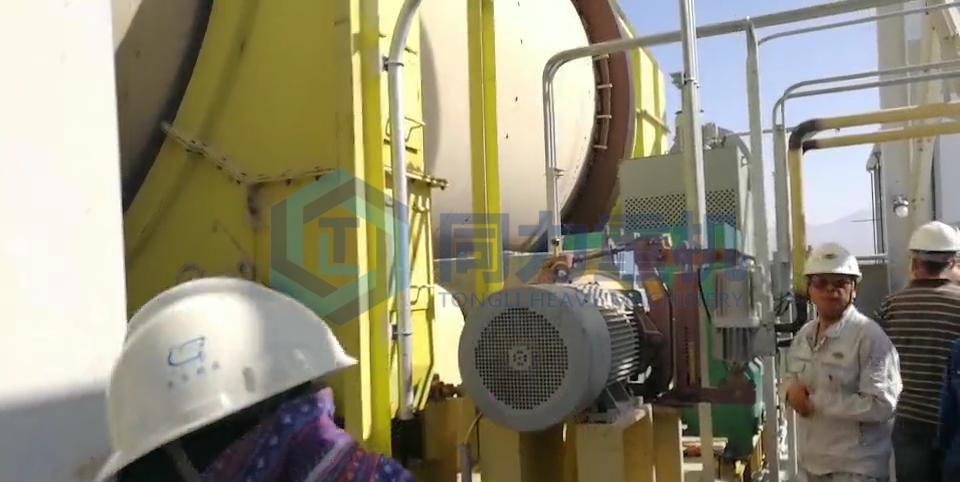
The GCT facility at M’dhilla specifically produces Triple Superphosphate (TSP) fertilizer. The ongoing M’dhilla-2 expansion is equipping the site with integrated sulfuric and phosphoric acid plants to bolster TSP production capacity.
- The M’dhilla facility is part of the M’dhilla-1 site within GCT’s southern industrial network (also including Gabès, Sfax, and Skhira)
- A major project known as M’dhilla 2 includes the construction of new units for sulfuric acid and phosphoric acid production—both essential inputs for the manufacturing of Triple Superphosphate (TSP)
- The existing plant already produces Triple Superphosphate (TSP) and has seen output levels of 200,000 tonnes in 2023, with projections aiming towards 250,000 tonnes in 2024—all destined for both domestic agricultural use and international markets
DAP / other fertilizers:
DAP production in GCT cluster is centered in Gabès; M’dhilla is mainly a TSP hub but new projects increase acid capacity that can supply DAP circuits.
Phosphoric acid / concentrated acid & sulphuric acid:
The site expansion projects add concentrated phosphoric acid and sulphuric acid units (to feed downstream fertilizer manufacture). Gabès/Skhira sites handle larger acid/DAP production within GCT’s network.
TSP (Triple Super Phosphate / Super 45):
Solid fertilizer product produced at M’dhilla (Mdhilla 1 and the Mdhilla-2 expansion project). M’dhilla supplies both domestic market and exports.
What is the capacity of M’dhilla GCT?
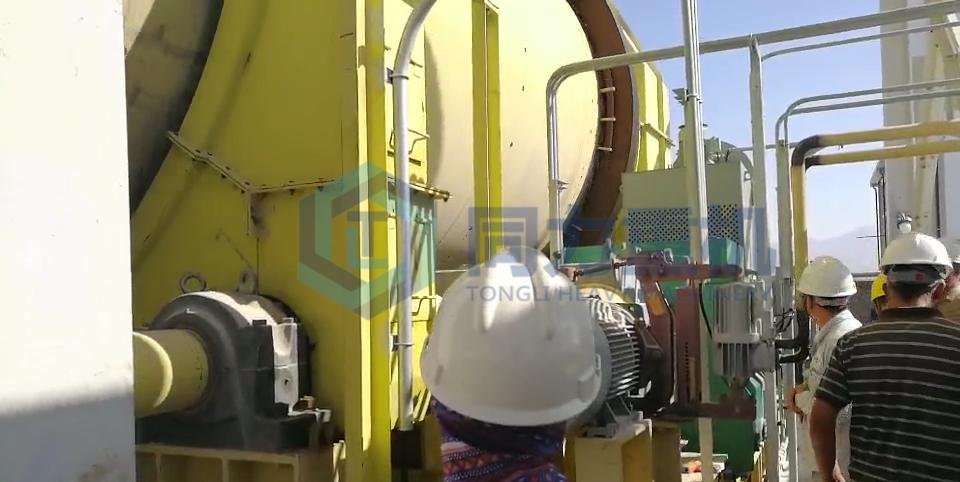
M’dhilla (existing + Mdhilla-2):
Older references and GCT annual reports state M’dhilla TSP plant capacity ~460–500 kt/year (figures vary by source and between M’dhilla 1 and the new phase). The announced M’dhilla-2 project (completion agreements signed) was reported to target roughly ~400,000 t/y TSP plus ~180,000 t/y concentrated phosphoric acid in press notices about the completion agreements.
Group totals:
GCT’s total P₂O₅ acid capacity historically reported ~1.65 million t/y (multiple units across Gabès, M’dhilla, Sfax, Skhira) and annual TSP figures in the hundreds of thousands across sites. (See GCT annual reports for year-by-year breakdown).
What is the technology / production process of DAP and TSP in M’dhilla GCT?
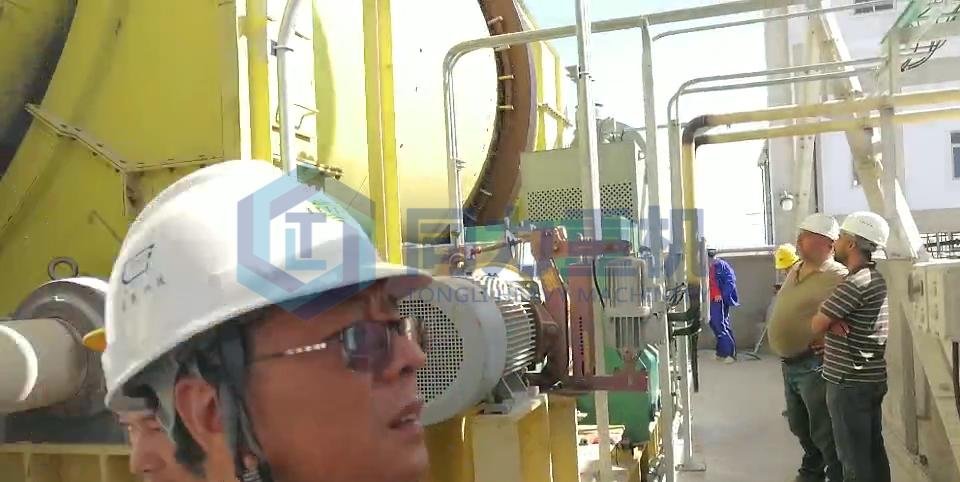
Triple superphosphate
At M’dhilla GCT the TSP route is based on wet-process phosphates: phosphate rock is milled and the site produces concentrated phosphoric acid (wet-process) from rock and sulphuric acid (the M’dhilla-2 project built an integrated sulphuric-acid + concentrated phosphoric-acid complex to feed the TSP unit). TSP is made by attacking phosphate rock with (concentrated) phosphoric acid to form a calcium-phosphate slurry (mono-calcium phosphate solution / slurry). That slurry is then processed (mixing, moisture control) and converted into TSP either as a dried powder or granulated product by spray or layering techniques, followed by curing, screening and packaging. The M’dhilla expansion explicitly aimed to supply on-site concentrated H₃PO₄ and reduce emissions while increasing TSP capacity to several hundred thousand tonnes per year.
DAP
DAP production requires concentrated phosphoric acid + ammonia. In a controlled ammoniation step (reactor), anhydrous ammonia is reacted with phosphoric acid to produce a hot MAP/DAP slurry; this slurry is then granulated (rotary drum or granulator/recirculating bed), dried, cooled and screened to give granular DAP (typical grade ~18-46-0). Within GCT, DAP manufacture has historically been performed at other sites of the group (e.g., Gabès), while M’dhilla’s major identified investment and expansion is focused on phosphoric acid and TSP output.
Quick comparison table — main steps & inputs (TSP @ M’dhilla vs DAP general)
| Stage / item | TSP (M’dhilla — wet-process TSP) | DAP (typical ammoniation/granulation) |
| Primary feedstock | Phosphate rock + concentrated phosphoric acid (H₃PO₄ produced on-site from rock + H₂SO₄). | Concentrated phosphoric acid + anhydrous ammonia. |
| Acid source | On-site sulphuric acid → wet phosphoric acid (M’dhilla-2 complex). | Same phosphoric acid source (could be on-site or imported); ammonia supplied as gas or liquid. |
| Core chemical reaction | Phosphate rock is attacked by phosphoric acid → formation of soluble mono-/di-calcium phosphate slurry that becomes TSP after drying/granulating. | NH₃ + H₃PO₄ → mono- and diammonium phosphates in reactor; controlled molar ratio and temperature to produce DAP. |
| Typical physical form produced | Powder or granulated TSP (>40% P₂O₅) — curing/aging step important. | Granular DAP (typical 18-46-0), produced via granulation/drying/cooling. |
| Process units visible in project docs | Sulphuric acid plant, wet-process phosphoric acid plant, TSP plant (reactors, mixers, granulator/dryer, storage). M’dhilla-2 project details list these units. | Ammoniation reactor(s), granulator (drum or tower), dryer, cooler, screens, bagging. |
| Environmental / solids handling notes | Generates phosphogypsum and requires decanting/management; M’dhilla-2 emphasised modern environmental controls. | Dust, ammonia slip and dust suppression/decanting are operational concerns; requires emission controls. |
Who is Tongli Heavy Machinery Co., Ltd
Tongli Heavy Machinery is one of the earliest manufacturers of compound fertilizer production line equipment in China and is also one of the largest manufacturers today. Tongli has been cooperating with CNCEC since 1996 to build the first NPK compound fertilizer production line in Bangladesh. Since then, the cooperation has continued and has been cooperating with CNCEC for more than 30 years. Tongli is a high-quality manufacturer of compound fertilizer equipment, DAP, and TSP equipment. Tongli provided the Tunisian Chemical Group M'dhilla TSP Plant with a 4x30m high-quality granulation dryer. The following is an introduction to this equipment.
What is a DAP granulation dryer?
A DAP granulation dryer is a type of industrial drying equipment used in the production of Diammonium Phosphate (DAP) fertilizer to reduce the moisture content of freshly granulated DAP particles before cooling, storage, or packaging.
What is the structure of a DAP TSP Sulfuric Acid Granulation Dryer?
1. Rotary Drum Shell
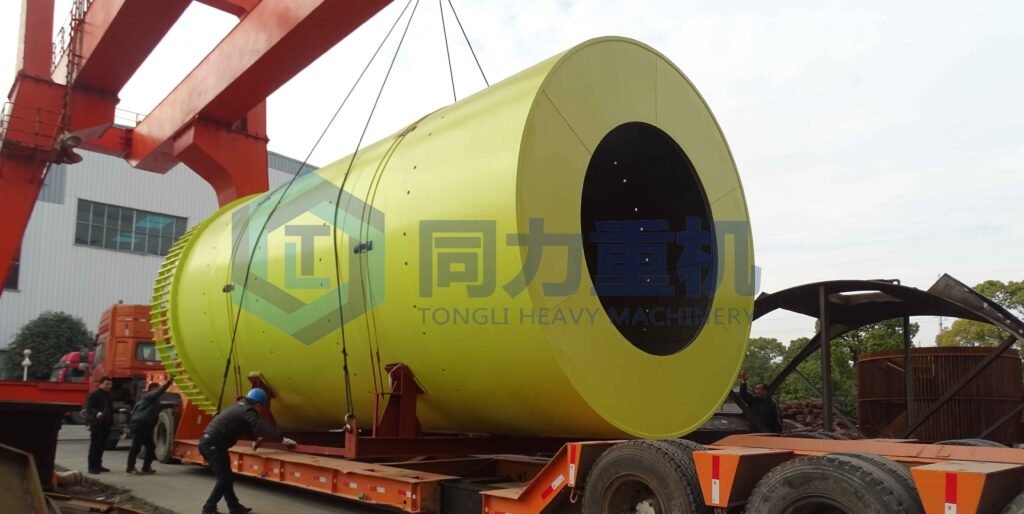
The main body of the dryer is a large, slightly inclined, rotating cylindrical shell made of carbon steel for strength and durability. The interior may have wear-resistant or corrosion-resistant lining in high-wear zones due to the mildly acidic DAP dust. Typical dimensions range from 1.8–3.6 meters in diameter and 12–20 meters in length, depending on capacity. The shell is supported externally by riding rings that sit on support rollers.
2. Feed Inlet and Hood Cover
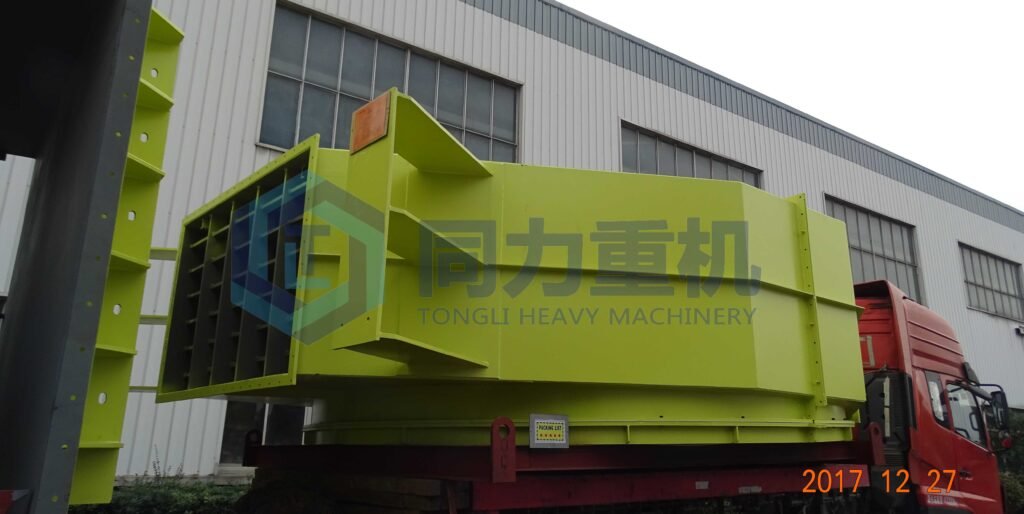
At the feed end, a hood cover encloses the inlet area, preventing dust escape and containing the hot gases inside. This section also houses the feed chute that transfers wet granules from the granulator into the drum. In direct-fired systems, this hood also supports the burner assembly for fuel combustion.
3. Internal Lifting Plates (Flights)
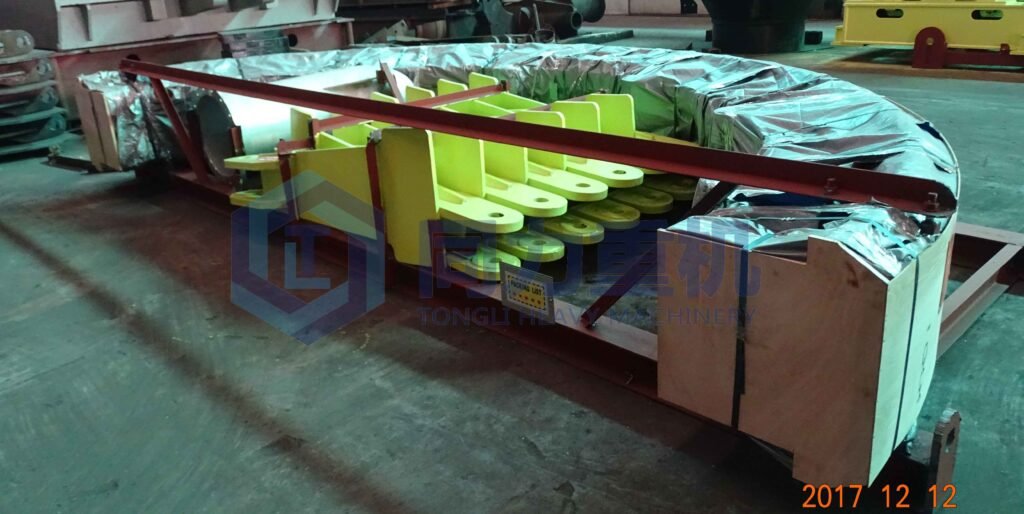
Inside the drum, lifting plates are welded along the shell interior. These plates lift and cascade the granules through the hot air stream to ensure uniform drying. Different shapes—radial, shovel-type, or curtain flights—are used to match the material flow pattern and moisture removal requirements.
4. Drive Assembly (Motor, Gearbox, Pinion, Girth Gear)
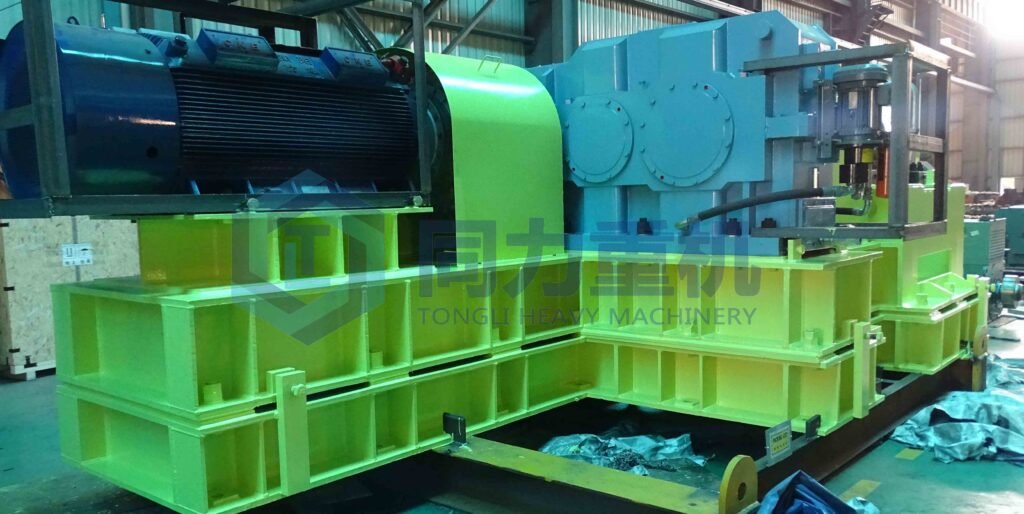
The drum rotation is powered by an electric drive motor, usually in the 15–155 kW range, which transmits motion through a gearbox that reduces speed to the required drum RPM. The gearbox drives a pinion gear that meshes with the large girth gear mounted around the drum shell. This robust gear system ensures smooth, reliable rotation under heavy loads.
5. Support Rollers and Riding Rings
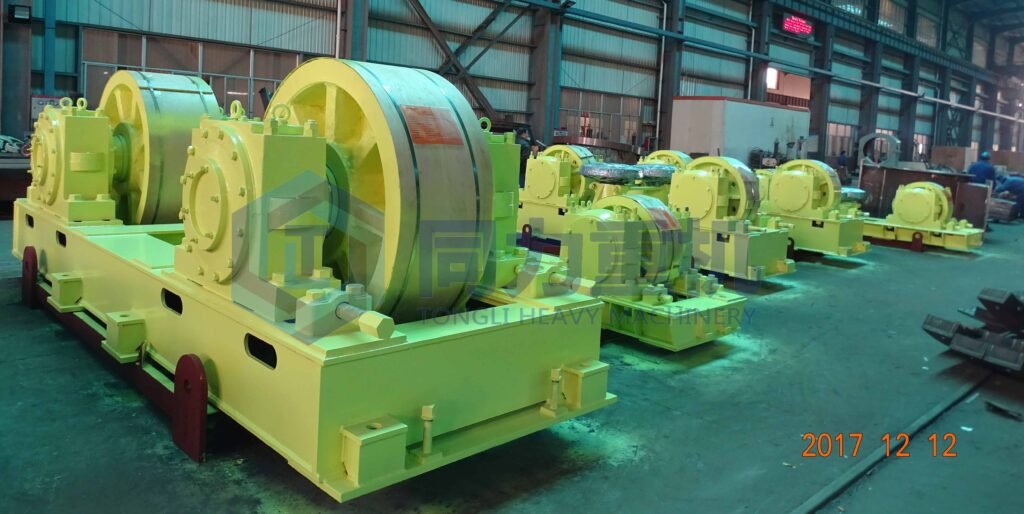
The drum is supported on heavy-duty support rollers mounted on a base frame. The rollers contact the riding rings welded around the drum’s circumference. Thrust rollers are installed to keep the drum in correct axial alignment and prevent horizontal movement during operation.
6. Exhaust and Airflow System
Hot gases from the burner flow through the drum to evaporate moisture. A primary air fan supplies combustion air, and an induced draft fan pulls exhaust vapors and fine dust through the exhaust duct toward dust control systems such as cyclones, bag filters, or scrubbers. This section ensures environmental compliance and heat flow control.
7. Discharge End and Box
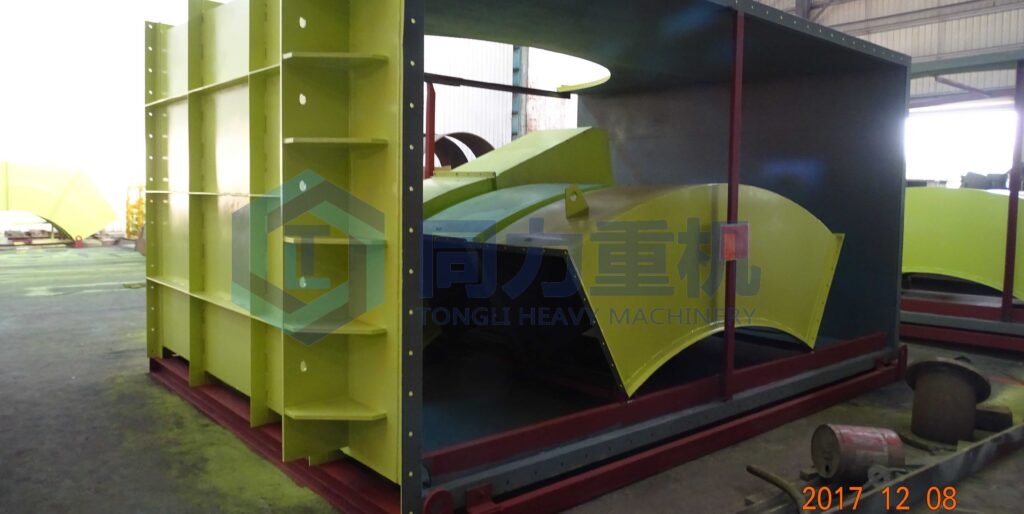
At the outlet, a discharge box encloses the exit point, guiding dried DAP granules into the downstream equipment, usually a rotary cooler or directly to a screener for size classification. The discharge box also contains sealing arrangements to prevent cold air ingress and dust escape.
8. Screener
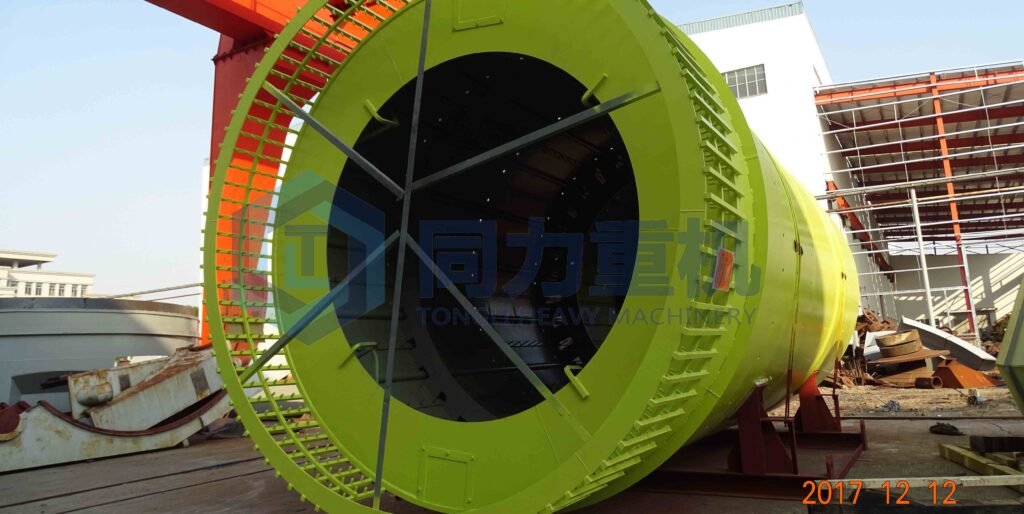
After leaving the dryer, the granules pass through a vibrating or rotary screener. This machine separates the product into different size fractions—oversized granules are crushed and recycled, undersized particles are returned to the granulator, and on-size granules move on to coating or packaging.
9. Foundation and Frame
The entire assembly—including the shell, rollers, drive, and inlet/outlet boxes—is mounted on a heavy-duty steel frame anchored to reinforced concrete foundations. This structure absorbs vibration, supports the heavy rotating body, and ensures long-term alignment.
Why Choose Tongli Heavy Machinery as your Fertilizer Equipment Manufacturer?
- Tongli Heavy Machinery has a solid foundation of manufacturing excellence that dates back to its establishment in 1958. With more than six decades of industrial heritage and over 8 years of focused experience in fertilizer equipment production, we combine time-tested engineering expertise with modern manufacturing technology to deliver high-performance solutions for our clients worldwide.
- Our production facilities are equipped with advanced machining centers, heavy-duty welding stations, precision balancing machines, and large-scale assembly workshops. This comprehensive capability allows us to produce complete fertilizer production lines, from granulators and dryers to coolers, coaters, and conveyors, all under strict quality control.
Your Quality is assured: Bureau Veritas/intertek/SGS/TUV Verified
Quality assurance is at the core of our operations. We are an SGS, Bureau Veritas (BV), and TUV verified supplier, and our products are CE certified for compliance with international standards. Each piece of equipment undergoes rigorous testing and inspection before delivery, ensuring long service life, high efficiency, and low maintenance costs. Want to know more about our quality control NDT process? Click Here
MT – Magnetic Particle Testing
- Uses a magnetic field and fine magnetic particles (dry powder or liquid suspension) to detect surface and near-surface cracks in ferromagnetic materials (like carbon steel).
- Cracks cause magnetic leakage fields, making the particles cluster at the defect.
- Common for weld inspections, shafts, and heavy steel parts.
UT – Ultrasonic Testing
- Uses high-frequency sound waves sent into the material to detect internal defects such as voids, cracks, or inclusions.
- The sound waves reflect back from flaws, and the signals are shown on a screen.
- Can also measure thickness and corrosion loss.
PT – Penetrant Testing
- Uses a liquid dye penetrant to seep into surface cracks and defects. After excess dye is removed, a developer is applied, which draws out the penetrant, making flaws visible.
- Works on non-magnetic materials too, like stainless steel, aluminum, or non-metallic parts.
- Ideal for detecting very fine surface cracks.
We are OEM for international well-known brands: Designated vendor of BASF
- Over the years, Tongli Heavy Machinery has built a reputation for reliability, customization, and technical support. Whether you require NPK, organic, or compound fertilizer equipment, or Vertical roller mill, or cement ball mill, our engineering team designs solutions tailored to your specific capacity, raw materials, and process requirements. From concept to commissioning, we work closely with our clients to ensure smooth installation, fast start-up, and sustainable operation. We are on the designated vendor list of BASF and a bunch of other world famous machinery companies.
- With a rich manufacturing history, modern production capacity, and a strong commitment to quality and customer satisfaction, Tongli Heavy Machinery is the trusted choice for fertilizer manufacturers seeking durable equipment and dependable service.
Recenet Year Fertilizer Project Reference List:
Many customers want to see a reference list to confirm whether we can manufacture equipment of this scale, whether we have the production capacity, and whether we have proven experience in the field. Our response is simple—we want you to feel completely confident. With over 65 years of industry experience, we are fully capable of delivering the most reliable and efficient fertilizer solutions available. Due to the NDA(Non-disclosure agreement) we have signed with our client we have to keep the project Anonymous, thank you for your understanding.

